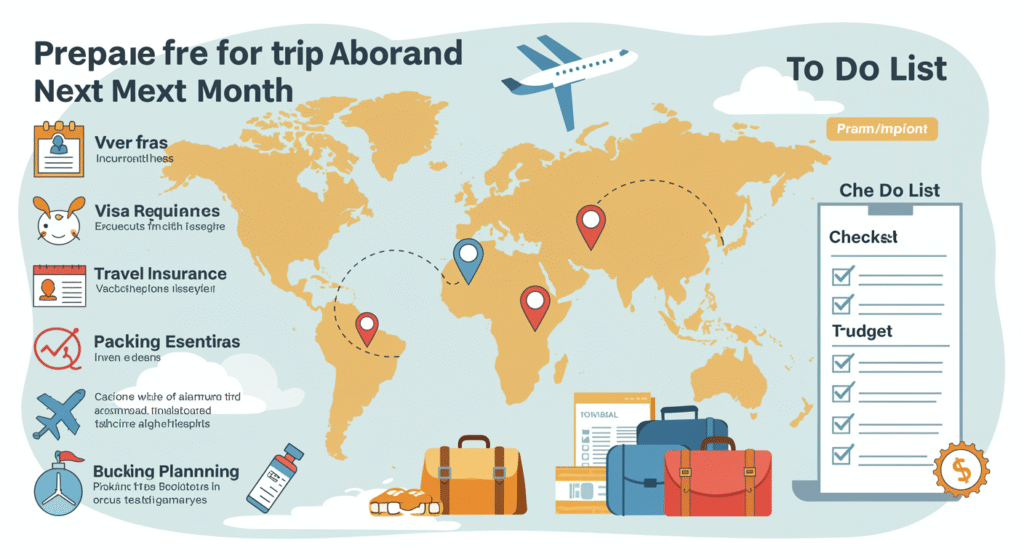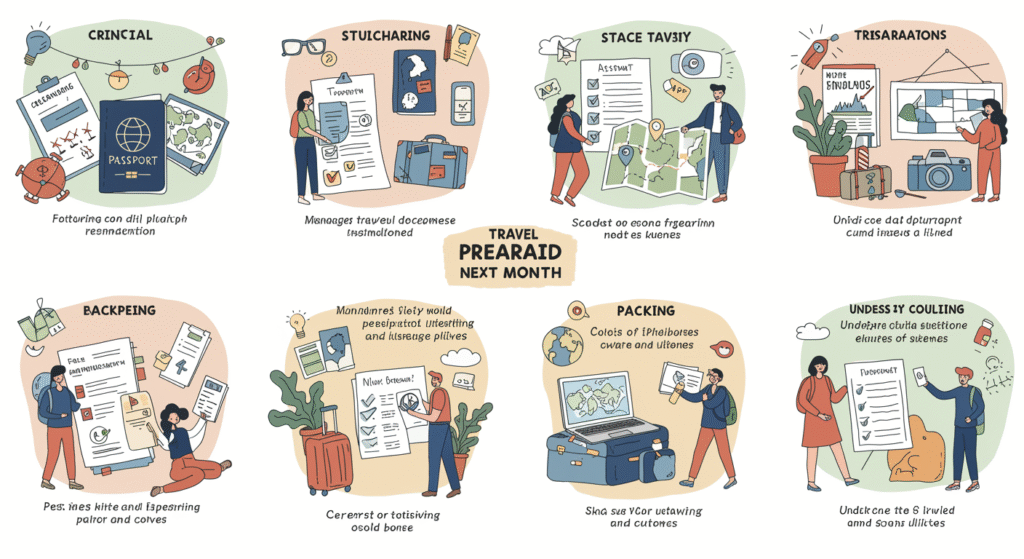
Traveling abroad is an exciting adventure that requires thoughtful preparation, especially when you’re leaving in a month. Whether it’s your first international trip or a seasoned journey, getting organized early can save you time, money, and stress. Here’s a comprehensive guide to help you prepare before your trip abroad next month.
1. Check Passport Validity and Visa Requirements

The first thing to do when planning an international trip is to check your passport’s validity. Many countries require your passport to be valid for at least six months beyond your travel dates. If you’re not sure, check now so that there’s enough time for renewal if needed. If you’re traveling to a country that requires a visa, apply well in advance, as processing times can vary.
Tip: Make a photocopy of your passport and keep it separate from the original, in case it gets lost or stolen during your travels.
2. Arrange Travel Insurance
Travel insurance is a must when going abroad. It protects you in case of emergencies such as medical issues, trip cancellations, lost luggage, or delays. With the unpredictable nature of travel, it’s wise to ensure you’re covered. Research different policies and choose one that suits your needs—whether it’s health coverage, trip cancellation, or adventure sports coverage if you plan to engage in activities like hiking or scuba diving.
Tip: Some credit cards offer travel insurance as a perk, so check if you already have coverage through your bank.
3. Book Accommodation and Flights Early
Booking your accommodation and flights early ensures you get the best rates and availability. If you haven’t already booked these, now is the time. For flights, check different airlines and booking sites to compare prices. For accommodation, whether you’re staying in a hotel, hostel, or vacation rental, securing your spot in advance will provide peace of mind.
Tip: Look for free cancellation options when booking hotels in case your plans change.
4. Make Health Preparations
Health should always be a priority, especially when traveling internationally. Visit your doctor or a travel clinic to see if any vaccinations or health precautions are needed for your destination. Certain countries may require proof of vaccinations (like yellow fever) before entry, so make sure to schedule those appointments early.
Tip: Pack a small first-aid kit with essential items such as pain relievers, antiseptic, bandages, and any prescription medications you take.
5. Research Local Culture and Etiquette
Each country has its own customs and cultural norms, and being aware of these can help you avoid misunderstandings and show respect to locals. Research important etiquette tips—such as tipping customs, dress codes, or polite behavior—so you can fit in seamlessly. This is especially important if you’re traveling to a place with a culture significantly different from your own.
Tip: Learn a few basic phrases in the local language like “hello,” “thank you,” and “goodbye” to break the ice with locals.
6. Set Up Your Finances
Inform your bank of your travel dates and destinations to avoid having your credit or debit card flagged for suspicious activity. Some banks also offer travel cards that are perfect for international use. It’s also a good idea to exchange some currency in advance for things like transportation, tips, or small purchases upon arrival.
Tip: Carry a mix of cash and cards. Not all places accept cards, especially in more remote areas.
7. Prepare Your Packing List
Packing can be a challenge, so it’s best to start preparing your list now. Think about your destination’s climate, the activities you plan to do, and the duration of your stay. Be sure to pack weather-appropriate clothing, comfortable shoes, travel adapters, toiletries, and any special items needed for your activities.
Tip: Don’t forget a universal adapter if traveling to a country with different plug types and voltage.
8. Set Up Communication Plans
Staying connected abroad is easier than ever, but it’s important to plan ahead. Check if your phone plan covers international roaming or if it’s better to get a local SIM card when you arrive. You can also look into renting a portable Wi-Fi device if you need consistent internet access.
Tip: Download helpful travel apps (like Google Maps, translator apps, and currency converters) to make navigating and communicating easier.
9. Make Copies of Important Documents
It’s always a good idea to have backup copies of your important documents, such as your passport, visa, travel insurance, and any emergency contacts. Keep a physical copy with you (separate from your originals) and store digital copies in a cloud or email them to yourself.
Tip: Share your itinerary and emergency contact information with a friend or family member in case of emergencies.
10. Final Checklist: Secure Your Home
As your departure date nears, make sure everything is in order at home. Lock windows and doors, set timers for lights to give the appearance of someone being home, and arrange for a trusted neighbor or friend to collect your mail. If you have pets, make sure you’ve arranged for someone to look after them.
Tip: If you’re traveling for an extended period, consider putting a hold on your mail delivery or setting up automatic payments for bills.
Conclusion
With a little bit of preparation, your trip abroad can be a smooth and unforgettable experience. Now that you’ve got a month to get everything in order, use this time wisely to check off each step on your list. Proper planning ensures that you can focus on enjoying your adventure, whether it’s for leisure, work, or study. Safe travels and happy planning!


